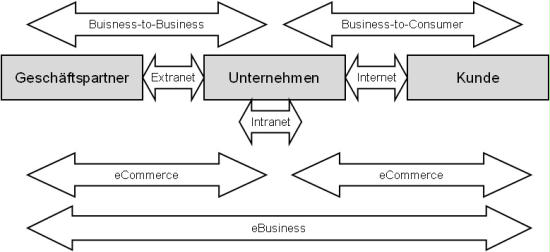Business & Internet: Einstiegskurs E-Business Definitionen
stefan.pauzenberger.uni-linz, 9. November 2010, 16:05
1. Definition:
Defining Electronic Commerce
- Business process. From a business process perspective, EC is doing business electronically by implementing business processes over electronic networks, thereby substituting information for physical business processes.
- Service. From a service perspective, EC is a tool that addresses the desire of governments, firms, consumers, and management to cut service costs while improving the quality of customer service and increasing the speed of service delivery.
- Learning. From a learning perspective, EC is an enabler of online training and education in schools, universities, and other organizations, including businesses.
- Collaborative. From a collaborative perspective, EC is the framework for inter- and intraorganizational collaboration.
- Community. From a community perspective, EC provides a gathering place for community members to learn, transact, and collaborate. The most popular type of community is social networks, such as MySpace and Facebook.
Defining E-Business
Some people view the term commerce as a describing only buying and selling transactions conducted between business partners. If this definition of commerce is used, the term electronic commerce would be fairly narrow. Thus, many use the term e-business instead.
E-Business refers to a broader definition of EC, not just the buying and selling of goods and services, but also servicing customers, collaborating with business partners, conducting e-learning and conducting electronic transactions within an organization. However, others view e-business as comprising those activities that do not involve buying or selling over the Internet, such as collaboration and intrabusiness activities; that is, it is a complement of the narrowly defined e-commerce. Finally, some define e-business as dealing with organizations' internal activities only, whereas e-commerce deals with external activities only.
(Turban, E. et al, Electronic Commerce 2010, A Managerial Perspective, Upper Saddle River, NJ: Pearson Education 2008, S. 46f)
2. Definition:
Definition E-Commerce
Definition E-Business

Gemeinsamkeiten/Unterschiede:
0 comments :: Kommentieren